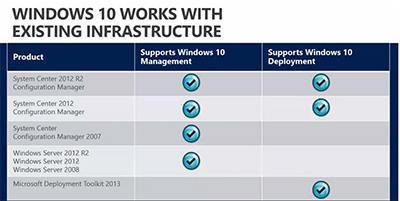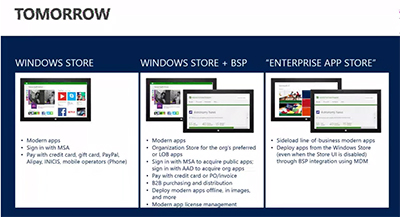News
Windows 10 Management Options Coming With New Windows Store
Microsoft plans to add Windows Store management capabilities for organizations using Windows 10 apps "in the coming months."
The new management capabilities are specifically associated with using Windows 10, which is still at the preview release stage. Jim Alkove, Microsoft's leader of the Windows enterprise program management team, outlined some of the Windows Store changes to come in a blog post today.
In general, Microsoft plans to provide a single Windows Store for all devices running Windows 10, including PCs, tablets and smartphones. To manage such apps, IT pros will have access to "a new Web-based Store portal" if they use Microsoft Azure Active Directory. The portal can acquire apps and then they can be assigned to end users, who just have to click on a link to download them, according to Alkove's description.
Smaller organizations will be able to create a "private section" within the new Windows Store for their apps. These organizations can put their Windows Store apps there, as well as their line-of-business customized apps, which can be uploaded to the new Windows Store, he noted.
Larger organization will have the option to create their own company portal for accessing Windows Store apps built for Windows 10. Apps are added to the portal by "sideloading" them.
Windows Store App Management
Management tools such as System Center Configuration Manager, Microsoft Intune or third-party mobile device management solutions can be used to perform app management tasks. Those management capabilities will include:
- Installing and uninstalling apps
- Controlling updates to apps
- Managing app licensing, including license reassignment
- Adding apps to Windows images
- Deploying provisioning packages
- Automatically installing apps from a premises-based server
The kind of management and deployment support enabled for Windows 10 by Microsoft's tools was described during a Windows 10 Management session at TechEd Europe by Michael Niehaus, a senior product manager on the Windows team. He presented the following slide listing that support:
 [Click on image for larger view.]
Figure 1. Windows 10 management options. Source: Microsoft TechEd Europe "Windows 10 Management" session.
[Click on image for larger view.]
Figure 1. Windows 10 management options. Source: Microsoft TechEd Europe "Windows 10 Management" session.
Niehaus explained that organizations will have multiple options for managing Windows 10 apps. The new Windows Store will enable volume purchasing of apps, options for distributing apps, the ability to curate the Windows Store for a selection of apps and the ability to manage app licenses.
The current Windows Store will still exist as it does for consumer users, but organizations will have new options to create a "curated organizational store" or a "managed organizational store." A new "business software portal" (BSP) will allow organizations to upload their own line-of-business apps to the BSP or inject apps into their own operating system images, he explained.
Here are the new Windows Store options as presented in one of Niehaus' slides:
 [Click on image for larger view.]
Figure 2. Windows Store development path. Source: Microsoft TechEd Europe "Windows 10 Management" session.
[Click on image for larger view.]
Figure 2. Windows Store development path. Source: Microsoft TechEd Europe "Windows 10 Management" session.
Organizations using app management tools from third-party software vendors such as AirWatch or Citrix also will be able to acquire apps for a company portal. End users can then launch these apps from that portal, regardless of it being cloud based or on premises, Niehaus added.
With the new Windows Store, updates to apps get pushed down automatically. However, Microsoft is working on a way to add controls for IT pros that will let them determine when the apps should be updated, Niehaus explained.
Other Prospects?
Much of what Niehaus and Alkove explained about the new Windows Store was previously described in an October 1 blog post by Oliver Niehus, a principal application development manager at Microsoft. However, his post got pulled by Microsoft.
Oliver Niehus had suggested that the new Windows Store would support Desktop apps, or Windows 7-style apps, too, but that point wasn't mentioned by Niehaus or Alkove. He also had described a business-to-business app provisioning capability, in which independent software vendors will be able provide apps directly to organizations, although that wasn't discussed by Niehaus or Alkove.
About the Author
Kurt Mackie is senior news producer for 1105 Media's Converge360 group.